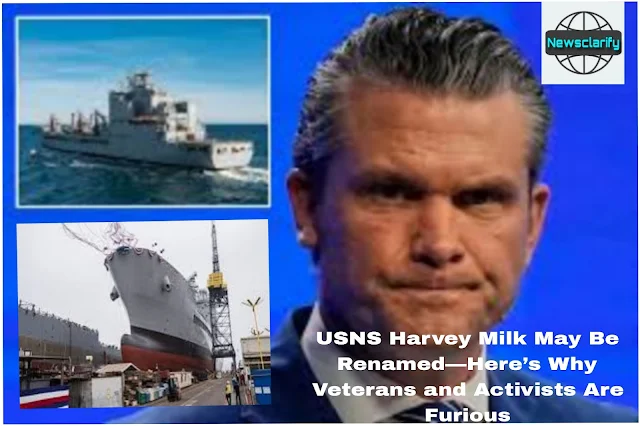When the USNS Harvey Milk was christened in San Diego back in 2021, Nicole Murray-Ramirez, a longtime LGBTQ rights activist, stood proudly at the forefront of the ceremony.
“It felt like a dream,” Murray-Ramirez recalled, glowing with emotion.
He never imagined his close friend—a gay Navy veteran turned civil rights icon in San Francisco—would ever have a Navy ship bear his name. But now, that tribute might be ripped away.
Defense Secretary Pete Hegseth has issued a controversial directive: the USNS Harvey Milk may be renamed, a rare and politically charged move.
“This administration is clearly trying to wipe out the LGBTQ community and its history,” said Murray-Ramirez. “They’re not just targeting LGBTQ stories—they’re erasing major chapters of American progress.”
What stings even more is the timing. The order reportedly came in June—Pride Month, a period dedicated to honoring the LGBTQ community.
The USNS Harvey Milk isn’t the only ship under scrutiny. Other vessels in the John Lewis-class may also be renamed, including the Thurgood Marshall, Ruth Bader Ginsburg, Harriet Tubman, Dolores Huerta, USNS Lucy Stone, USNS Cesar Chavez, and USNS Medgar Evers.
To some veterans, the move is pointless and disruptive.
“This doesn’t make us more ready for war—it’s just a distraction,” said James Seddon, a Navy veteran with over 20 years of service.
He emphasized the logistical chaos such changes would cause.
“You’re talking about reprinting thousands of items—from ship ball caps to uniform patches,” he explained. “It’s not just paint on steel—the ship’s name is in raised lettering. You’d have to grind it off and rebuild it. That’s expensive, wasteful, and unnecessary.”
But for Seddon, it’s more than money—it’s about morale.
“This could spark division within the crew. Some might back the name change, others won’t. That kind of tension chips away at unit cohesion and training focus,” he warned.
The push for renaming fits squarely within the Trump administration’s agenda to dismantle diversity, equity, and inclusion (DEI) across the federal government.
“Renaming these ships isn’t about logistics—it’s about rewriting history and silencing legacies,” said Professor Adisa Alkebulan of San Diego State University’s Africana Studies Department. “These names represent people who shaped what freedom and liberty really mean.”
Dr. Gregory Daddis, a U.S. war historian and Army veteran who teaches at SDSU, echoed that sentiment.
“The John Lewis-class ships are symbols of courage and forward progress. They honor those who expanded civil rights, not shrank them,” Daddis said.
He views the move as a troubling sign of a broader issue.
“This is more than a name change—it’s a signal. The politicization of our military is dangerous. When you start erasing these names, you’re peeking into a much deeper problem,” he warned.
A Pentagon statement addressed the decision, saying in part: “Secretary Hegseth is dedicated to ensuring that all Department of Defense assets reflect the Commander-in-Chief’s priorities, our national heritage, and the warrior ethos.”


